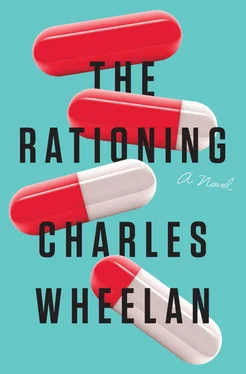“Sure,” I said. “This is good news.” After a moment, I asked, “Who is most likely to get sick?”
Tie Guy leaned back in his chair and stretched. “No pattern at all, as far as I can tell,” he said. “I looked for every possible correlation: young, old, black, white, preexisting illness. I have no clue who gets sick from the virus, or why. The people who die are the ones who are too stubborn to get treated, but we figured that already.” Tie Guy was in a better mood now, pleased with his work. He said, “I’ll trim it down to five or six slides. Can I at least put in the photo of the magnified dust mite?”
“If you want,” I said.
“It’s a sick photo.” He looked up at the food and other garbage spread across the table. “I’ll clean this up before the Director gets here.”
“I don’t think she’ll care,” I said. It felt like the first completely honest thing I had said that morning.
THE DIRECTOR ARRIVED ABOUT TWO HOURS LATER, AS planned. The office was nearly abandoned; most of the team members who had been working all night had gone home. Tie Guy went through the same slides, still excited by the work he had done. “Do you have a slide with the incidence of Capellaviridae outside the United States?” the Director asked.
“I’ve got a couple of things like that,” Tie Guy answered. After a few seconds of flipping quickly through the slide deck, he stopped at a slide titled “ Dermatophagoides mensfarinae Endemic Areas” with a map of the world. There was the familiar purple pattern in the U.S. and a few purple patches in other countries with similar latitudes: Canada, Northern Europe, a few places in Russia and China. “Those are places where you find the vector, the dust mite. It’s just not that common outside the U.S.” I knew why the Director was asking: How much Dormigen was the rest of the world going to need? The less they needed, the more they could give us.
“What about incidence of Capellaviridae ?” I asked.
“It’s about what you’d expect,” Tie Guy answered. He projected another slide with a map of the world and red dots randomly distributed across it. The only obvious clusters were in major population centers. “The international data are not great, but it seems to be the same pattern as in the U.S. The people who get sick are the ones who have spent time in an area where the dust mite is endemic and then moved to a place where it’s not.”
The Director asked Tie Guy to assemble his team in the bigger conference room. People were beginning to trickle back into the office, looking showered and somewhat refreshed. The Director (or more likely her assistant) had ordered a catered breakfast, which was being set up hurriedly by two young guys wearing brown shirts that read GILLIAN’S CAFÉ. It was not the usual stale muffins and not-from-New York bagels; there was a tray of nice-looking breakfast sandwiches and a huge bowl of fresh raspberries, strawberries, and blueberries—not even watered down with tasteless chunks of unripe honeydew and cantaloupe. The Director saw me eyeing the food. “Grab a plate,” she said. I had not had breakfast. I could not remember if I had eaten dinner the night before. I had fallen into the habit of eating whatever food the White House put out during our meetings, whenever that happened to be.
As the last few task force members filled plates at the makeshift buffet, the Director called the room to order. “I don’t want to ruin your breakfast with a long speech,” she said, prompting modest laughter. “Thank you. Thank you. That’s really all I have to say. I know how hard all of you have been working. I really appreciate that effort. The American people thank you—or they would if they knew how important this work is. Fifty years ago, a disease like this could have been devastating. Thanks to the work of people like you—steady progress at every turn—science is making our lives safer and better. Too often this kind of work is overlooked, especially the little discoveries and insights, but those little insights add up to huge discoveries over time. I’m here this morning to tell you that the work you are doing is really important. So thank you. Now eat!” There was some awkward applause and then a collective attack on the breakfast sandwiches.
I was impressed, not just by the Director’s foresight in ordering the breakfast, but by the poise she brought to her talk. It was not the Gettysburg Address, but I could tell looking around the room that her words mattered. She was what my mother would describe as “put together,” though it sounds less patronizing and sexist when she says it than when I write it. The Director was fiftyish and fit, if not necessarily thin. She wore a nicely tailored navy-blue skirt and jacket and a gold necklace of some sort. She looked professional, which I mean not in the bland, meaningless sense of the word, but rather that the people in the room looked to her and believed that she was someone who should be in charge. I had never thought much about leadership, but in that moment I had a sense that I had just seen it, and it felt different than what I had previously envisioned.
The free food mattered, too, not because the people in the room could not afford a good breakfast sandwich, but because they spent their days doing work that most of their friends and family could not understand, getting paid far less than their dafter college classmates who went to Wall Street or Silicon Valley. Finally someone had shown up and explained to them convincingly that what they were doing really mattered. It never would have dawned on me to do that. I was even more impressed when we climbed into the back of the Director’s car. She slumped against the seat and exhaled audibly. For the first time, I could see how much effort she had mustered to give her little breakfast talk. After a moment I said, “It’s reasonably good news, don’t you think?”
“I suppose,” she said quietly. The tone of her response ended the conversation for thirty seconds or so. Eventually she continued, “There’s no way to prepare a vaccine in the time we have?”
“Anything is possible,” I said. “But, yes, it’s hard to imagine how that would happen. We have no handle on who is most likely to get sick, so we would have to vaccinate everyone. That would be logistically difficult in ten days, even if we had a vaccine.”
“That’s what the CDC people said.”
“It’s still worth working on,” I offered.
“There is a team doing what they can.”
We pulled into the portico at the White House and made our way to a small West Wing office to get ready for our briefing. The Director sat down and immediately began responding to e-mails on her phone. After fifteen minutes or so the Strategist appeared in the doorway, unshaven and looking somewhat harried. I distinctly remember wondering how anyone could look so disheveled before nine-thirty in the morning. “We have a situation,” he said. “The briefing is going to have to wait.”
“A situation?” the Director asked in amazement. “Are you kidding me? This is the situation.” The Strategist did not reply. He just turned and left.
THIS SOON BECAME ONE OF THE MOST FRENETIC DAYS OF the crisis. We sat in our conference room for more than an hour, like two patients in a dentist’s office wondering if our appointments had been forgotten. The door was open and we could see a flurry of officious staffers passing briskly by. At one point, the Chief of Staff appeared in the corridor and the Director leaped out of her chair to ask what was happening. “I’m so sorry,” the Chief of Staff said. “The President is in the Situation Room. Everything is backed up. Maybe an hour or so?” As always, I was impressed by her courtesy and grace amid the craziness.
Читать дальше












